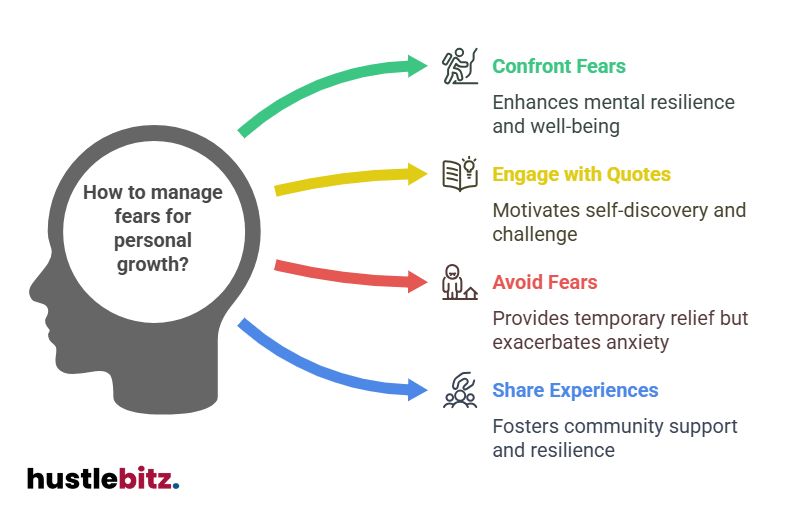Overcoming fear is crucial for improving mental health and fostering resilience. Fear can lead to anxiety and disrupt daily functioning, making it vital to confront rather than avoid it. Facing fears stimulates personal growth, enhances confidence, and reduces stress. Inspirational quotes serve as powerful tools, motivating individuals to navigate their challenges and embrace courage. By reflecting on these quotes, one can cultivate a mindset that views fears as opportunities for self-discovery. Each step taken against fear strengthens emotional well-being, creating a foundation for a healthier mindset. Discover how powerful quotes can further inspire your journey toward overcoming fear and enhancing mental health.
Key Takeaways
- Confronting fears fosters personal growth, enhancing mental resilience and overall well-being.
- Engaging with inspirational quotes can motivate individuals to challenge their fears and embrace self-discovery.
- Fear avoidance may provide temporary relief but can ultimately exacerbate anxiety and disrupt daily functioning.
- Sharing transformative experiences creates community support, fostering connections and resilience among individuals facing similar challenges.
- Regular reflection on empowering quotes reinforces commitment to overcoming fears and promotes emotional strength.

Understanding Fear’s Impact

Fear significantly influences mental health by triggering anxiety, limiting personal growth, and impairing overall well-being. The mechanisms of fear, such as heightened emotional responses and altered fear perception, can lead to significant psychological effects. Fear triggers, whether situational or internal, can activate a cycle of fear avoidance, where individuals may attempt to evade situations that provoke anxiety, ultimately restricting their daily lives and choices.
This anxiety connection can manifest in various forms, including social anxiety, phobias, and generalized anxiety disorders. Each of these conditions demonstrates how fear can interfere with an individual’s ability to engage fully in life. Understanding these dynamics is critical for developing effective fear management strategies that promote mental health.
Coping strategies, such as cognitive-behavioral techniques, mindfulness practices, and exposure therapy, can help individuals address their fears constructively. These approaches encourage the development of fear resilience, allowing individuals to confront their fears rather than avoid them. By reframing their emotional responses and understanding their fear triggers, individuals can cultivate a healthier relationship with fear.
Recognizing the impact of fear on mental health is essential for fostering personal growth and well-being. By addressing fear through informed management techniques, individuals can break free from the constraints of anxiety and open pathways to a more fulfilling life. Ultimately, understanding fear’s impact is the first step toward empowering oneself in the journey of mental health improvement.
The Connection Between Fear and Mental Health
The intricate relationship between fear and mental health underscores the profound impact that emotional experiences can have on psychological well-being. Fear responses can manifest in various forms, including heightened anxiety and avoidance behaviors, which may significantly disrupt daily functioning and quality of life. Understanding fear triggers is essential for effective anxiety management, as individuals often react to perceived threats with heightened emotional responses that can lead to chronic stress.
Emotional regulation becomes a critical skill in navigating these fear responses. By developing an awareness of fear perception, individuals can begin to identify irrational or exaggerated fears that may stem from past experiences or learned behaviors. This awareness can facilitate the implementation of coping mechanisms that promote psychological safety and resilience.
Fear avoidance, a common strategy adopted by many, may provide temporary relief but often exacerbates anxiety in the long run. Engaging in fear therapy can be a constructive approach to confront and reframe these fears, fostering mental resilience. Through therapeutic intervention, individuals learn to challenge their fear-based narratives and gradually expose themselves to their fears in a controlled manner.
Ultimately, recognizing the connection between fear and mental health is vital for anyone seeking to improve their emotional well-being. By addressing the underlying factors associated with fear and employing effective strategies, individuals can enhance their capacity for emotional regulation, paving the way for a healthier, more fulfilling life.
Benefits of Facing Your Fears

Confronting fears can lead to significant personal growth and enhanced mental resilience, ultimately transforming anxiety into a source of strength. Engaging in fear exposure allows individuals to challenge their perceptions and confront situations that once seemed daunting. This process not only aids in anxiety management but also fosters fear resilience, empowering individuals to respond more effectively to future stressors.
Facing fears contributes to confidence building, as each small victory reinforces a positive mindset shift. This cumulative effect nurtures emotional strength and prepares individuals to tackle life’s obstacles, promoting a sense of life balance. Moreover, overcoming fears can facilitate stress reduction, as one becomes less hindered by anxiety and more capable of navigating everyday challenges.
| Benefits | Description |
| Personal Growth | Expanding comfort zones fosters development and maturity. |
| Confidence Building | Achieving small goals boosts self-esteem and capability. |
| Emotional Strength | Building resilience enhances the ability to cope with adversity. |
Cultivating Resilience Through Quotes

Quotes can serve as powerful tools for cultivating resilience, offering inspiration and perspective during challenging times. They can promote resilience building by encouraging individuals to engage in quote reflection, allowing them to confront their fears and embrace personal growth. By internalizing positive affirmations found in these quotes, individuals can foster emotional strength and better manage their fears.
The process of resilience is often marked by mindset shifts, where one learns to view challenges as opportunities for self-discovery rather than insurmountable obstacles. Inspirational narratives encapsulated in quotes can provide a roadmap for navigating life’s difficulties, reminding us that overcoming obstacles is not only possible but also a vital component of our personal journey. Each quote serves as a gentle nudge, urging us to embrace resilience as an essential aspect of our mental health.
Furthermore, the practice of regularly revisiting these quotes can create a routine of introspection that reinforces our commitment to resilience. As we reflect on the wisdom embedded in these words, we find ourselves better equipped to face adversities with a renewed sense of purpose and clarity. In moments of doubt, the right quote can be a source of motivation, reminding us of our inherent strength and capacity for growth.
Ultimately, embracing quotes in our daily lives can be a transformative practice, guiding us towards a more resilient mindset and enriching our journey of self-discovery.
Powerful Quotes on Courage
Embracing courage is essential for overcoming fear and navigating life’s uncertainties, and powerful quotes can serve as guiding beacons in this pursuit.
These quotes often encapsulate the essence of courageous actions and provide motivation sources that inspire individuals to confront challenges head-on. Whether it’s through personal growth or implementing fear management and self-empowerment strategies, the wisdom of inspirational leaders can foster bravery techniques that are crucial for overcoming anxiety and building confidence.
Consider the following powerful quotes that resonate deeply with the journey of courage:
- “Courage is not the absence of fear, but the triumph over it.” – Nelson Mandela
- “You gain strength, courage, and confidence by every experience in which you really stop to look fear in the face.” – Eleanor Roosevelt
- “It’s not whether you get knocked down, it’s whether you get up.” – Vince Lombardi
These insights remind us that bravery is not merely about the absence of fear, but rather the willingness to act despite it.
By embracing these powerful words, individuals can find the inspiration needed to engage in courageous actions, paving the way for improved mental health.
As one cultivates confidence through these reflections, they can effectively implement bravery techniques that lead to meaningful transformations in their lives.
Engaging with powerful quotes on courage ultimately fuels the journey toward self-empowerment and resilience in the face of life’s myriad challenges.
Stories of Transformation

Transformative stories often illuminate the profound impact that overcoming fear can have on an individual’s mental health and overall well-being. These narratives serve as powerful personal anecdotes, revealing how individuals navigate their fear journeys and emerge stronger. Each story encapsulates transformative experiences that highlight the resilience of those who have faced daunting challenges.
For instance, consider the journey of a young woman who battled social anxiety. Through small, incremental steps, she gradually confronted her fears, leading to significant mental health victories. Her journey illustrates how empowerment narratives can encourage others to embrace their own healing processes.
Similarly, a man who once feared public speaking transformed his life by sharing inspirational triumphs, ultimately becoming a motivational speaker himself.
These growth moments are not merely isolated incidents; they represent a collective testament to the strength found in vulnerability. As individuals share their experiences of overcoming challenges, they inspire others to embark on their own paths of resilience. The stories of transformation reveal that fear, when addressed, can become a catalyst for profound personal development.
Final Thoughts
Overcoming fear is a transformative process that not only improves mental health but also fosters personal growth and resilience. By confronting fears head-on, individuals can cultivate confidence, reduce anxiety, and build emotional strength. Inspirational quotes and stories of courage serve as powerful tools in this journey, offering motivation and insight into the benefits of embracing fear rather than avoiding it. As you face your own fears, remember that each step forward is a victory, contributing to a healthier mindset and a stronger, more resilient self. Through this journey, you’ll discover that fear is not a barrier, but an opportunity for growth and self-discovery.




